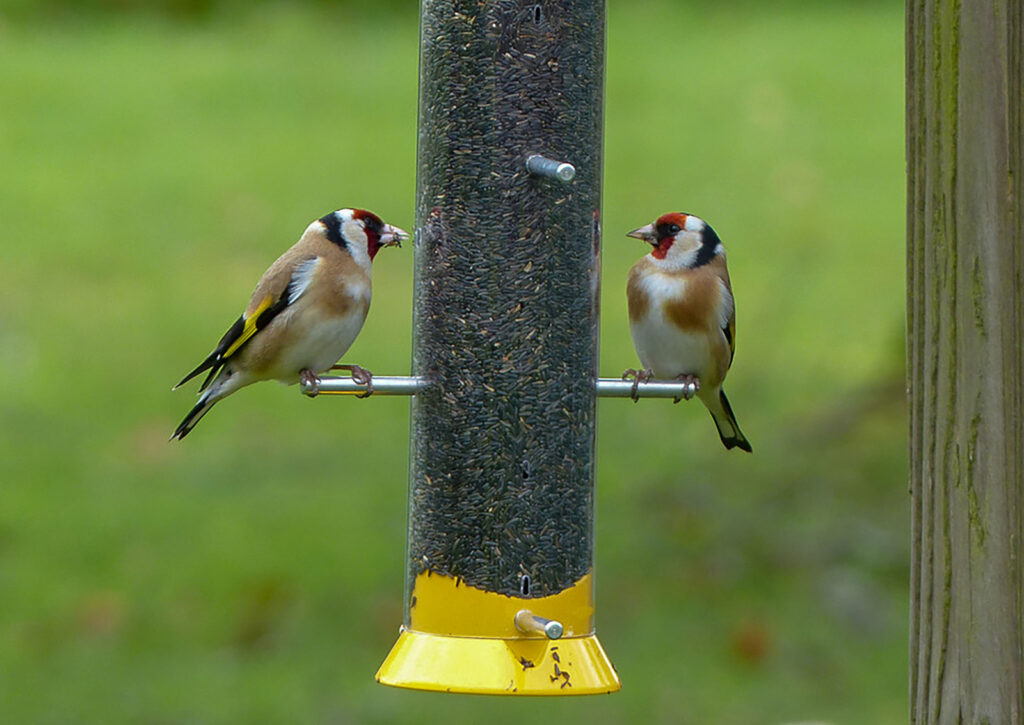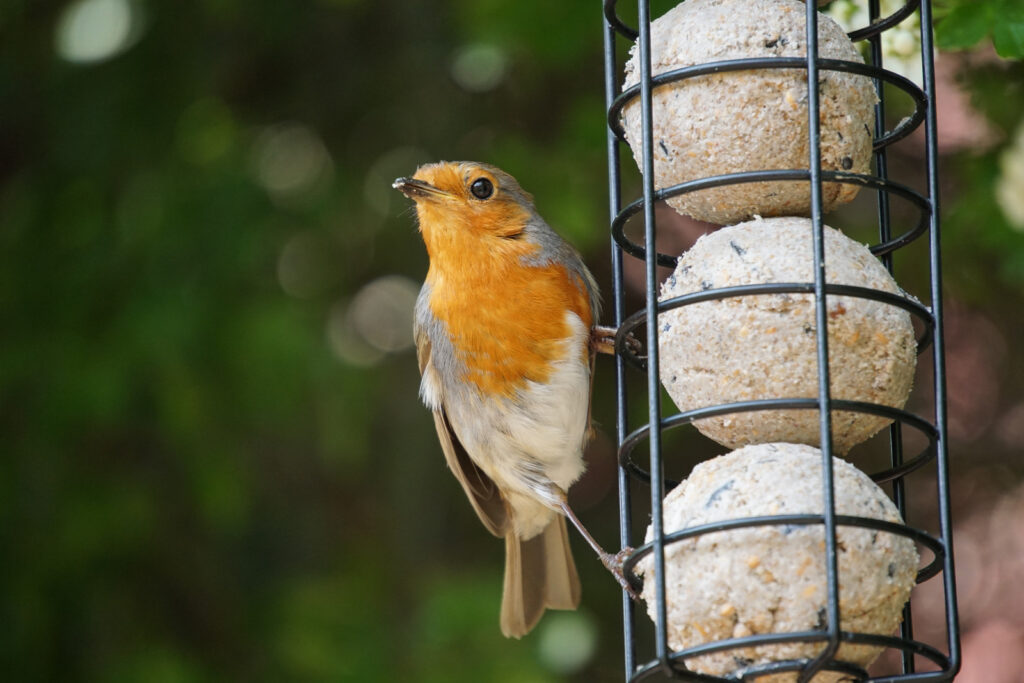Whether we’re feeding wild birds in our garden or looking after pets of our own, it’s great to watch our feathered friends enjoy their dinner! But with a whole range of bird food types out there, how do you choose the right option? Here we run through the different types of food that garden birds can eat and also give some pointers on how to choose your pet’s diet.
What should you feed birds in your garden?
If you feed wild birds in your garden, there’s no doubt they’ll be thankful for it! When natural food is scarce, the offerings you provide can be a real lifeline for your feathered friends. What’s more, watching them enjoy the food you offer is an endless source of entertainment!
There are loads of different wild bird foods out there, from seeds and nuts to insect foods to fat balls. Which to choose depends on the time of year and the birds you’re hoping to attract. Here’s what you need to know about the different types available:

Seeds and Nuts
When it comes to seeds, an all-time favourite is black sunflower seeds. These high-energy seeds are a great source of nutrition and they’re especially popular with finches and tits. It’s also possible to get just the sunflower hearts if you want to avoid the mess from the husks in your garden!
Niger seeds for birds are tiny black seeds that attract a slightly different range of hungry hopefuls. They’re a favourite with goldfinches and siskins and sometimes redpolls, though other garden birds love them too. Since these seeds are so small, they can fall out of normal feeders and so it’s best to have a special niger seed bird feeder to contain these tasty bites.
In terms of nuts, peanuts are the most popular type out there. In spring and summer it’s important to offer them in a mesh feeder as whole peanuts can be a choking hazard for chicks. It’s also possible to get peanuts chopped up into granules that are a super treat for fledgelings and smaller birds like robins, wrens and dunnocks.
Seed and nut mixes
As well as choosing special types of seeds and nuts, you can get lots of different sorts together in a seed mix. The advantage of a varied mix is that you can attract a wider range of birds to your garden. Mixes also come in ‘no mess’ options that don’t include seed husks, and ‘no grow’ varieties where the seeds have been specially prepared and cut so they don’t sprout underneath your bird table or feeder!
While some mixes appeal to a wide range of birds, others are optimised for particular species. Mixes containing raisins and flaked maize can attract blackbirds and thrushes, while robins love a combination of sunflower hearts, mealworms and rowan berries.
Fat balls and bird cake
Foods based on fat are fab for birds in the winter months as they provide lots of much-needed energy. Fat balls containing suet, nuts and seeds are a great treat in cold weather, though if the products come in nylon mesh bags, it’s important to remove the mesh so that birds don’t trap their feet while enjoying their dinner.
Another option is a feeder pre-filled with fat – for example, a coconut shell or bamboo tube. These feeders look good in the garden and often last longer than fat balls.
Insects and mealworms
Mealworms go down a treat with insect-eating birds such as robins, blue tits and pied wagtails. They might not look very appetising to us humans, but they’re really good for our feathered pals!
If you buy dried mealworms, it helps to soak them for 20min–1hr in water before putting them outside to make them easier for young birds to eat and digest. Always be careful with hygiene though to reduce the risk of Salmonella – it’s best to store dried mealworms in the fridge and only put a small amount out at once so they get eaten up quickly.
To avoid handling mealworms on their own, you can also choose a seed and nut mix that contains mealworms and other insects. You can just put this out like a normal mix and you’re sure to see some blue tits turning up to the buffet!
Household scraps
Some kitchen scraps can make a tasty addition to the bird table, but it’s important to choose these carefully. While grated cheese, small crumbs of pastry and fruit scraps go down well, some other leftovers aren’t so good for our feathered friends. Too much salt can be dangerous for birds, so food like bacon can do them more harm than good.
Another thing to be careful about is feeding birds bread – while birds do like this filler food, it isn’t good for them in large quantities because it doesn’t contain the nutrients they need. So avoid offering too much bread, and also bear in mind that breadcrumbs that make it on to the ground can attract rats. In general, carefully chosen kitchen scraps are a tasty addition to top up the bird table but you’ll probably find it easier to use bird food as the mainstay of the menu.
When should you feed garden birds?
We generally think about feeding birds in the winter, and a common question amongst bird lovers is when to stop feeding birds in spring. However, it’s actually best if you can feed your feathered friends all year round! Birds can struggle with food shortages over the summer months, especially when earthworms disappear deep underground. So birds will appreciate food all year, though you can change what you feed depending on the season.
In general, high-fat foods are best over winter as birds need lots of energy to get through the colder times. Suet balls are a good choice in harsh weather, as are seeds and nuts. In fact, some winter seed mixes are specially designed to support birds through the chilly times of year.
Over the summer, birds need less energy but more protein to grow new feathers in the moulting season. The summer menu should also be safe for adult birds to feed to their chicks, so it’s best to avoid chunks of bread and loose whole peanuts, as these can be a choking hazard for baby birds. Black sunflower seeds, mealworms and seed mixes without peanuts are all good for feeding birds in summer.

What can pet birds eat?
The best diet for pet birds depends on the species and what they’d naturally eat in the wild. Some birds like budgies would eat mainly seeds, while others live mostly on fruit and some eat insects and invertebrates too. A small number of birds such as the lorikeet and lori mainly drink nectar, and so we need to feed them a special nectar substitute.
Although many of the birds we keep as pets are seed eaters, it’s generally not enough for them to have a diet of dry seeds and nothing else. This is because they need various micronutrients including iodine, calcium and vitamin A, and it’s difficult to get these from seeds alone.
For some birds, you can offer seed-based mixes supplemented with all the nutrients they need (e.g. for budgies and parakeets). However, many birds are selective feeders – parrots in particular are known for being fussy! Offering a complete and nutritionally balanced pelleted food is a great way of solving this problem. It can be difficult to persuade a bird to change their diet though, so do ask your vet for some expert advice if you’re struggling!
In general, it’s best to look up your feathered friend’s particular nutritional requirements and consult with your vet if in any doubt. They’ll also be able to advise on what kinds of fruit and veg to offer alongside – for many species of pet birds, veggies should make up about 15–30% of the diet.
Hopefully this has been a useful guide to what birds eat! As well as food, it’s also important to offer birds enough water for drinking and bathing. Learn more about bird baths and how to keep them clean in our guide.
Love a good freebie? Sign up below to be the first to know about our great offers…


